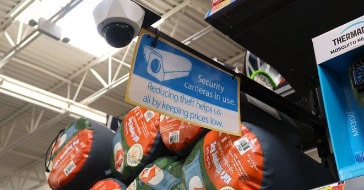The UK is launching a wide-ranging initiative against shoplifting that includes introducing facial recognition technology to capture offenders.
On Monday, the country’s police authorities and representatives of 13 of the UK’s biggest retailers announced the Retail Crime Action Plan, inviting retailers to submit CCTV footage of shoplifting incidents. The police plans to run the digital images through the Police National Database using facial recognition.
The anti-shoplifting drive also includes Project Pegasus, an initiative to build a comprehensive intelligence picture of organized crime gangs across the country. The project, first announced in September, brings together businesses and policing authorities to develop a new information-sharing platform.
“While it is encouraging to see a 29 percent increase in charges for shoplifting in the past year, the rise in offending is unacceptable and there is much more to do to stop it happening in the first place,” says Crime and Policing Minister Chris Philp.
Pegasus is the first national partnership of its kind, according to the UK government. The project is funded by the Home Office, John Lewis, the Co-op, M&S, Boots, Primark and several more retailers, who have collectively pledged to provide over £840,000 (over US$1 million).
The majority of funding will go towards creating a team of specialist analysts and intelligence officers to work within OPAL, a policing unit focused on organized acquisitive crime. The team will be operational later this month with the first results expected by the New Year.
Pegasus will be spearheaded by Katy Bourne, the Business Crime lead for the Association of Police and Crime Commissioners (APCC).
“Pegasus will be a game changer in the fight against retail crime providing for the first time an accurate national picture of the organized groups from local families to cross-border criminals driving organized shop theft,” says Bourne.
Over the past years, shoplifting cases have soared in the UK with criticism mounting against the police for failing to take the incidents seriously. Over 365,000 shoplifting offenses were recorded by police in England and Wales until June this year, according to official figures cited by the BBC. According to the British Retail Consortium, however, there were eight million cases of shoplifting in the 12 months ending in February, costing retailers nearly £1 billion (US$1.2 billion) a year. The shoplifting is often performed by organized gangs targeting luxury retail items.
Policing authorities have been promising to change that with Policing Minister Philp pushing for expanding facial recognition use in all police forces nationally. This month, the UK’s largest police force, the Metropolitan Police announced “game-changing” results in capturing criminals after it matched 149 suspects from images captured by CCTV cameras.
Despite the push, facial recognition use in retail has also found itself under persistent criticism.
The policing minister and the UK Home Office have been accused by privacy advocacy Big Brother Watch of lobbying for Facewatch, known for deploying facial recognition surveillance in retail stores across the UK. The accusation came after the company’s founder met with Philp and other senior Home Office officials in a closed-door meeting. During the meeting, the Home Office agreed to advocate rolling out facial recognition in high street stores and supermarkets, media revealed in July.
Article: UK launches facial recognition drive against shoplifters
